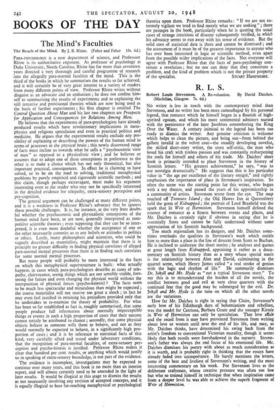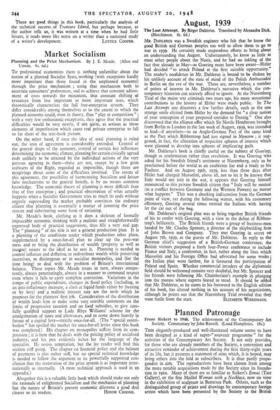R. L. S.
No writer is less in touch with the contemporary mind than Stevenson, and no writer has been more camouflaged by his personal legend, that romance which he himself began in a flourish of high- spirited egoism, and which his more sentimental admirers nursed with the persistence of the later Jacobites remembering the King Over the Water. A century inimical to the legend has been too ready to dismiss the writer. Any genuine criticism is welcome which helps to clean the picture, and bring out—from behind the gallant invalid in the velvet coat—the steadily developing novelist, the skilled short-story writer, the stern self-critic, the man who loved his craft with tireless passion and was constantly resharpening the tools for himself and others of his trade. Mr. Daiches' short book is primarily intended to place Stevenson in the history of Scottish letters. "His greatest achievement," he says, " was to use nostalgia dramatically." He suggests that this is his particular value in "the age par excellence of the literary emigre," and rightly emphasises the importance of place in Stevenson's inspiration. So often the scene was the starting point for this writer, who began with a toy theatre, and pased the years of his apprenticeship in a community of artists. Stevenson wrote from the eye. The map tonched off Treasure Island ; the Old Hawes Inn at Queensferry held the germ of Kidnapped; the portrait of Lord Braxfield was the spark that lit Weir of Hermiston. Stevenson himself defined the essence of romance as a fitness between events and places, and Mr. Daiches is certainly right if obvious in saying that he is essentially Soots and cannot be fully understood without some appreciation of his Scottish background.
Too much regionalism has its dangers, and Mr. Daiches some- times overlooks the qualities in Stevenson's work which entitle him to more than a place in the line of descent from Scott to Buchan. He is inclined to underrate the short stories ; he analyses and quotes at great length from Kidnapped, appraising it rather as a docu- mentary on Scottish history than as a story whose special merit is the relationship between Alan and David, culminating in the quarrel scene, which Henry James called "a real stroke of genius with the logic and rhythm of life." He summarily dismisses Dr. Yekyll and Mr. Hyde as "not a typical Stevenson story." To say this is to misunderstand the burden of all the novels, the conflict between good and evil at very close quarters with the continual fear that the good may be submerged by the evil. Dr. yekyll and Mr. Hyde is the tune on which all the other novels are the variations.
How far Mr. Daiches is right in saying that Claire, Stevenson's early love of his Edinburgh days of boheznianism and rebellion, was the model for Catriona, Barbara Grant and the younger Kirstie in Weir of Hermiston can only be speculation. That love affair and the recoil from it may have prevented Stevenson from writing about love or women until near the end of his life, and may, as Mr. Daiches thinks, have determined his swing back from the artist's freedom to conventional Victorian morality, though it seems likely that both recoils were foreshadpwed in the nursery. Steven- son's father was always the real focus of his emotional life. Mr. Daiches dismisses his poetry with about as much consideration as it is worth, and is probably right in thinking that the essays have already faded into unimportance. He barely mentions the letters, some of the best and liveliest of Stevenson's writing, and thz most interesting commentary on his work. For Stevenson lives as the deliberate craftsman, whose creative pressure was often too low but who so trained himself in technique that when inspiration came from a deeper level he was able to achieve the superb fragment of Weir of Hermiston.
There are good things in this book, particularly the analysis of the technical success of Treasure Island, but perhaps because, as the author tells us, it was written at a time when he had little leisure, it reads more like notes on a writer than a sustained study



































 Previous page
Previous page